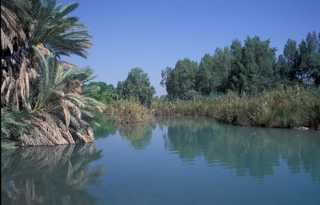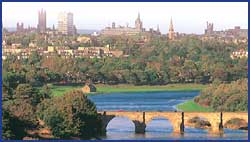 7th Framework Programme 2007 call for proposals (preliminary results)
7th Framework Programme 2007 call for proposals (preliminary results)
2007 call for proposals (preliminary results) Following the 2007 call of the 7th Framework Programme under the Environment (including climate change) Theme, several proposals have
been selected for funding with a direct or indirect interest to water and marine policies. The
following section (the list is not exhaustive) gives examples of projects that are currently being
negotiated and will be soon operational, subject to their successful conclusion.
o Enhancing the role of wetlands in integrated water resources management for twinned
river basins in EU, Africa and South-America in support of EU Water Initiatives (WETwin).
This project aims to improve the community service functions (of wetlands) while conserving good ecological status.
o The Mediterranean Intermittent River ManAGEment (MIRAGE) project has several objectives linked to the hydrological characterisation of temporary streams for the Mediterranean region, including the setting of reference conditions and a link to programmes of measures for the achievement of good ecological status under the WFD.
o European EeL Investigation and Assessment of their Decline (EELIAD). The project uses satellite-communicating data-loggers to map the locations of European eels as they migrate to spawning grounds, and identifying biological and ecological characteristics, as well as anthropogenic factors that contribute to their migration success and reproduction.
o Assessment of the interaction between corals, fish and fisheries, in order to develop monitoring and predictive modelling tools for ecosystem based management in the deep waters of Europe and beyond (CoralFISH).
This project aims to develop methodologies and indicators for baseline and subsequent
monitoring of closed areas and for the better understanding of coral habitat fish-carrying
capacity through the integration of fish data into coral ecosystem models.
o Advancing understanding of Atlantic Salmon at Sea: Merging Genetics and Ecology to
Resolve Stock-specific Migration and Distribution patterns (SALSEA-Merge). By merging genetic and ecological investigations, this project aims to advance understanding of stock specific migration and distribution patterns and overall ecology of the marine life of Atlantic salmon and gain an insight into the factors which have resulted in recent significant increases in marine mortality.
o Marine Ecosystem Evolution in a Changing Environment (MEECE). The specific goals are
to improve the knowledge base on marine ecosystems and their response to climate and
anthropogenic driving forces, and to develop innovative predictive management tools and
strategies to resolve the dynamic interactions of the global change driver, i.e. changes in
ocean circulation, climate, ocean acidification, pollution, overfishing and alien invasive
species on the structure and functioning of marine ecosystems.
o Caspian sea environmental and industrial data & information service (CASPINFO). This
project aims to initiate and maintain a Caspian Sea network of leading environmental and
socio-economic research institutes, governmental departments, oil & gas industries, and international bodies, jointly working on the definition, development and operation of the CASPINFO data & information service.
o Integration and enhancement of key existing European deep-ocean observatories (EuroSITES). These project's objectives are integrating and enhancing the existing deep ocean observatories into a coherent European network, and performing specific science missions that will, in the future, form the basis for sustained monitoring of key environmental features.
o ACoustic technology for OBserving the interior of the ARctic Ocean (ACOBAR). This
aims to develop a system for environmental monitoring of the interior of the Arctic Ocean
by incorporating data obtained by acoustic methods, including tomography, data transmission from underwater platforms, communication and navigation of floats and gliders under the ice cover. This will fill one of the most pronounced and recognised data gaps in the ocean climate observing system. Two specific projects will also be funded addressing aspects on climate change and water, including extreme events:
o The CLIMATEWATER research project's overall objective is to study European and international adaptation measures and strategies related to climate change impacts and how these are taken into account in water policies. The project will formulate a coherent framework on adaptation strategies of climate change impacts on water resources, water cycling and water uses of society and nature. In the area of analysing and management of droughts, the XEROCHORE project (started in May 2008) will investigate Europe's risk from drought by assessing research needs
and policy choices in areas of drought. The overall aim is to assist in the development of a
European Drought Policy in accordance with the EU-Water Framework Directive (EU-WFD)
and other related policies (e.g. CAP, Regional Funds, health aspects).
| Contact information |
European Commission, DG Environment, Unit D2, Rue de la Loi, 200, B-1049 Brussels, Belgium - Editor - © European Commission, 2008
(email: philippe.quevauviller@ec.europa.eu) Phone: Fax: +32 2.2968825 |
|---|---|
| News type | Inbrief |
| File link | n/a |
| Source of information | WISE |
| Keyword(s) | climate change, EU-INCO-MED, FP7 |
| Subject(s) | HYDRAULICS - HYDROLOGY , INFORMATION - COMPUTER SCIENCES , MEASUREMENTS AND INSTRUMENTATION , METHTODOLOGY - STATISTICS - DECISION AID , POLICY-WATER POLICY AND WATER MANAGEMENT , RISKS AND CLIMATOLOGY |
| Geographical coverage | EU |
| News date | 16/07/2008 |
| Working language(s) | ENGLISH |
 you are not logged in
you are not logged in





